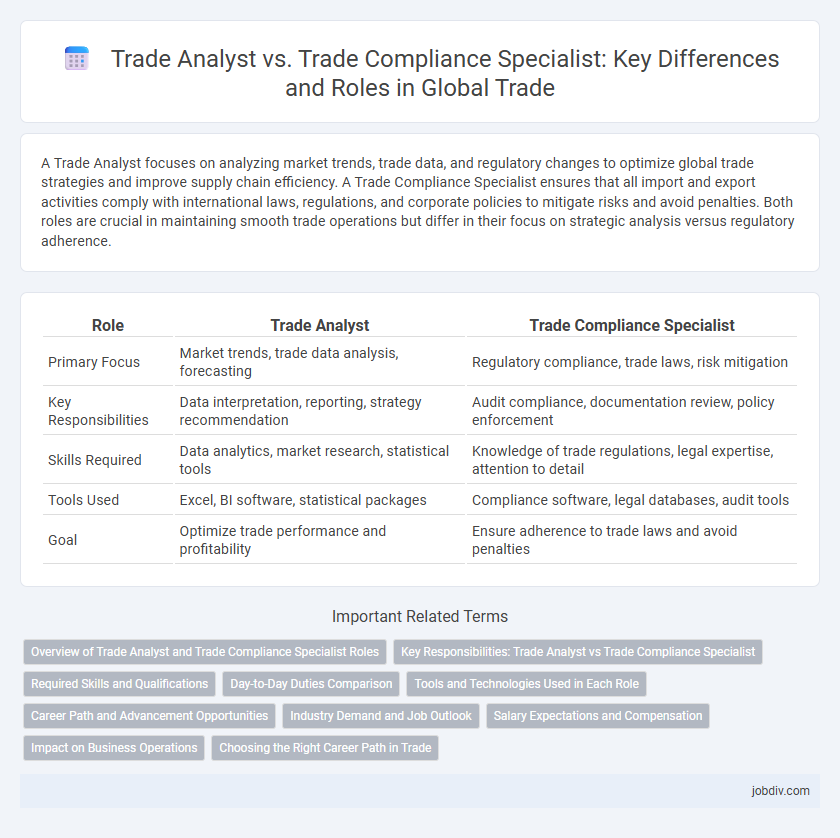A Trade Analyst focuses on analyzing market trends, trade data, and regulatory changes to optimize global trade strategies and improve supply chain efficiency. A Trade Compliance Specialist ensures that all import and export activities comply with international laws, regulations, and corporate policies to mitigate risks and avoid penalties. Both roles are crucial in maintaining smooth trade operations but differ in their focus on strategic analysis versus regulatory adherence.
Table of Comparison
| Role | Trade Analyst | Trade Compliance Specialist |
|---|---|---|
| Primary Focus | Market trends, trade data analysis, forecasting | Regulatory compliance, trade laws, risk mitigation |
| Key Responsibilities | Data interpretation, reporting, strategy recommendation | Audit compliance, documentation review, policy enforcement |
| Skills Required | Data analytics, market research, statistical tools | Knowledge of trade regulations, legal expertise, attention to detail |
| Tools Used | Excel, BI software, statistical packages | Compliance software, legal databases, audit tools |
| Goal | Optimize trade performance and profitability | Ensure adherence to trade laws and avoid penalties |
Overview of Trade Analyst and Trade Compliance Specialist Roles
Trade Analysts evaluate market trends, data, and trade flows to optimize supply chain performance and forecast trade opportunities. Trade Compliance Specialists ensure adherence to international trade laws, regulations, and company policies to mitigate legal risks and facilitate smooth cross-border transactions. Both roles are critical for maintaining efficient, lawful, and profitable global trade operations.
Key Responsibilities: Trade Analyst vs Trade Compliance Specialist
Trade Analysts focus on data interpretation, market trends analysis, and forecasting to support strategic decision-making and optimize supply chain efficiency. Trade Compliance Specialists ensure adherence to international trade laws, regulations, and company policies by managing documentation, conducting audits, and overseeing regulatory reporting. Both roles are critical in managing risk, but Trade Analysts prioritize economic and market data, whereas Trade Compliance Specialists emphasize legal compliance and regulatory frameworks.
Required Skills and Qualifications
Trade Analysts require strong analytical skills, proficiency in data analysis tools like Excel, SQL, and knowledge of global market trends and trade regulations to evaluate trade performance and identify opportunities. Trade Compliance Specialists need expertise in regulatory frameworks such as ITAR, EAR, and customs laws, attention to detail, risk assessment capabilities, and experience with compliance software to ensure adherence to trade policies and prevent violations. Both roles benefit from strong communication skills and a solid understanding of international trade practices and documentation.
Day-to-Day Duties Comparison
Trade Analysts focus on analyzing market trends, monitoring trade data, and developing reports to support strategic decision-making. Trade Compliance Specialists ensure adherence to international trade regulations, manage import/export documentation, and conduct internal audits to prevent compliance violations. Both roles require collaboration with cross-functional teams but differ with Trade Analysts centered on data-driven insights and Trade Compliance Specialists on regulatory adherence.
Tools and Technologies Used in Each Role
Trade Analysts leverage advanced data analytics software like Tableau, Excel, and SAP to analyze market trends and optimize trade strategies. Trade Compliance Specialists utilize compliance management systems such as Amber Road, Integration Point, and customs regulation databases to ensure adherence to international trade laws and mitigate risks. Both roles require proficiency in ERP systems and real-time trade monitoring tools to maintain operational efficiency and regulatory compliance.
Career Path and Advancement Opportunities
Trade Analysts typically advance by developing expertise in market analysis, supply chain optimization, and economic forecasting, often progressing to senior analyst or trade strategy roles. Trade Compliance Specialists follow a career path centered on regulatory knowledge, auditing, and risk management, with opportunities to move into compliance management or global trade advisory positions. Both roles offer distinct advancement routes, with Trade Analysts focusing on data-driven decision-making and Trade Compliance Specialists emphasizing regulatory adherence and policy enforcement.
Industry Demand and Job Outlook
Trade Analysts and Trade Compliance Specialists are both in high demand due to increasing globalization and complex regulatory environments. Trade Analysts focus on market trends, data analysis, and forecasting to inform business decisions, while Trade Compliance Specialists ensure adherence to trade laws and regulations, reducing legal and financial risks. Industry demand for Trade Compliance Specialists is rising faster owing to stricter international trade regulations, but Trade Analysts remain crucial for strategic planning in competitive markets.
Salary Expectations and Compensation
Trade Analysts typically earn between $60,000 and $85,000 annually, reflecting their role in market research and data analysis for optimal trade strategies. Trade Compliance Specialists command salaries ranging from $70,000 to $95,000, driven by their critical responsibility to ensure adherence to international trade regulations and avoid costly legal penalties. Compensation packages for both roles often include performance bonuses, benefits, and opportunities for professional development, with Trade Compliance Specialists generally receiving higher overall remuneration due to the compliance risk management aspect.
Impact on Business Operations
A Trade Analyst drives business operations by analyzing market trends, optimizing supply chain strategies, and enhancing profitability through data-driven insights. A Trade Compliance Specialist ensures operations align with international trade regulations and mitigates risks by preventing legal penalties and delays. Together, these roles support efficient trade processes that balance operational growth with regulatory adherence.
Choosing the Right Career Path in Trade
Trade Analysts focus on market trends, data analysis, and forecasting to optimize trade strategies and improve profitability for companies engaged in international trade. Trade Compliance Specialists ensure adherence to trade laws, regulations, and customs requirements to mitigate risks and avoid costly penalties in global commerce. Choosing the right career path depends on whether you prefer analytical roles centered on market dynamics or regulatory positions focused on legal compliance within the trade industry.
Trade Analyst vs Trade Compliance Specialist Infographic

 jobdiv.com
jobdiv.com